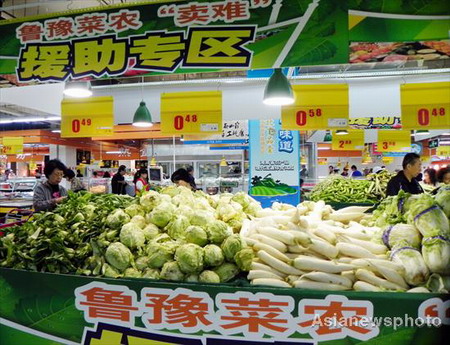Economy
Farmers need help with crop choices
By Tan Zongyang (China Daily)
Updated: 2011-05-02 09:35
 |
Large Medium Small |
|
 |
|
Customers buy vegetables from Shandong and Henan in a supermarket in Beijing May 1, 2011. Twelve supermarkets in Beijing jointly advocated that supermarket chains should act to maintain the stability of the vegetable market and protect the interests of vegetable farmers suffering from price slumps. [Photo/Asianewsphoto] |
BEIJING - The current drop in vegetable prices that is causing so much hardship to farmers in China is due to the lack of an information platform to guide farmers to plant according to market demand, industry insiders and experts said.
A non-profit institution should be established to provide information services for farmers, experts suggested at a symposium on Friday in Beijing, which was organized by the China Vegetable Marketing Association to discuss the recent slump in vegetable prices.
"We lack a platform that can collect data to reflect the demand for vegetables in the market," said Dai Zhongjiu, director of the association. "Such a platform, if established, could help farmers decide what to plant and how much they should produce."
Dai said one of the main reasons for the latest fall in vegetable prices was over-supply.
"Chinese farmers tend to grow vegetables that were previously in short supply, which then leads to a sudden glut of certain vegetables."
The unusually warm weather is another factor contributing to the increase in production, while the radiation leaks from Japan's Fukushima Daiichi nuclear power plant have resulted in public concern that vegetables may be contaminated, which has led to a decrease in demand, he added.
| ||||
"If the seed price of a certain kind of vegetable soars sharply, it shows too many farmers are growing this vegetable and farmers would do better growing a different vegetable," he said.
But experts said changes need to be made to the country's disorganized agriculture system in order to remedy the situation, because such measures were only a temporary stopgap and that in the long run an information platform must be established to prevent the under- or oversupply of vegetables.
"Agriculture in China is too scattered. The farmers are unorganized, the distributors are small businesses and the wholesalers and retailers have no unifying management," said Fan Jianping, chief economist of the State Information Center of China.
Fan pointed to Japan's agriculture system as an example. It has a national association, which functions as a centralized platform for made-to-order farming.
"The association in Japan effectively links farming with distribution and sales, which is more scientific than China's market-driven planting plans," he said.
| 分享按钮 |



